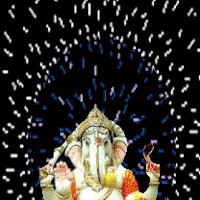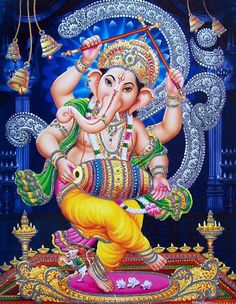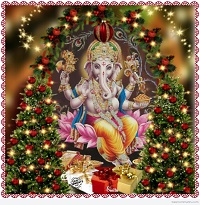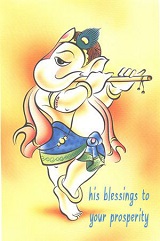Shloka
Shlokas on Lord Ganesha
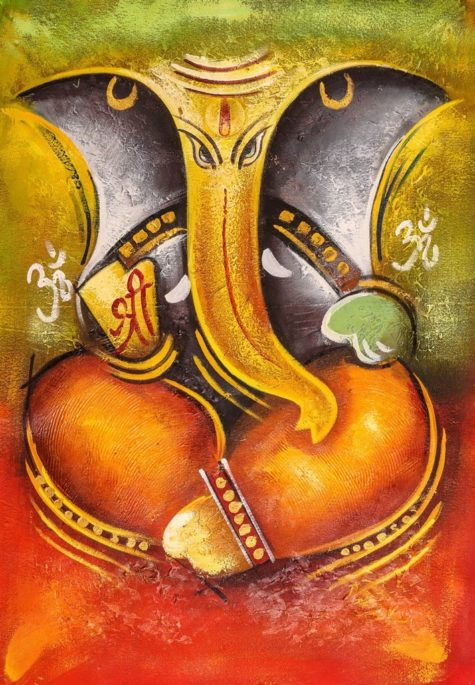
What is a Shloka?
Shloka is a Sanskrit word referring to a verse, proverb, hymn or poem that uses a specific meter. It is considered as the classic basis for epic Indian poetry as its use is widespread in traditional Sanskrit poems. Among the famous texts written entirely in shlokas are the “Ramayana” and “Mahabharata.”
Technically, a shloka can be made up of any sort of four-line stanza with up to 26 letters in a single line. In terms of yoga practice, it is likely that a yogi who meditates will come across this classical form of verse in the mantras that can help one meditate effectively.
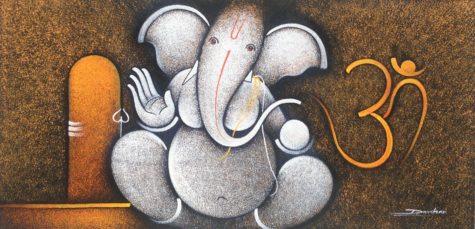
Shlokas on Lord Ganesh:
Shuklaambara Dharam Vishnum
Shashi Varnam Chatur Bhujam
Prasanna Vadanam Dhyaayet
Sarva Vighna Upashaanthaye
Meaning: We meditate on Lord Ganesha – who is clad in white (representing purity), who is all pervading (present everywhere), whose complexion is gray like that of ash (glowing with spiritual splendor), who has four arms, who has bright countenance (depicting inner calm and happiness) and who can destroy all obstacles (in our spiritual and worldly path).

Vakratunda Mahakaaya
Suryakoti Samaprabha
Nirvighnam Kuru Mey Deva
Sarva Kaaryeshu Sarvada
Meaning: The Lord with the curved trunk and a mighty body, who has the luster of a million suns, I pray to thee Oh Lord, to remove the obstacles from all the actions I intend to perform.

Agajaanana Padmaarkam
Gajaananam Aharnisham
Anekadantham Bhaktaanaam
Ekadantam Upaasmahey
Meaning: I worship day and night that elephant faced Lord Ganesha who is like sun to the lotus face of Mother Parvati. Giver of many boons, the single tusked Ganesha, I salute Thee to give me a boon.

Gajaananam Bhoota Ganaadhi Sevitam
Kapitta Jamboophaala Saara Bhakshitam
Umaasutam Shoka Vinaasha Kaaranam
Namaami Vighneswara Paada Pankajam
Meaning: The Lord with the elephant face, served by all the Ganas, One who takes as His food, the essence of Kapitta and Jamboophala (these are two favorite fruits of Ganesha), son of Uma (Mother Parvati), destroyer of misery of the devotees, controller of obstacles, we worship Your Lotus Feet.

Ganaanaam Twam Ganapathi Gam Havaamahe
Kavim Kaveenaam Upamasra Vastamam
Jyeshta Raajam Brahmanaam Brahmanaspatha
Aanashrunvanna Oothibhi Seedha Saadanam
Meaning: We invite You, the Lord of spiritual faith (of Lord Shiva). You are the wisest among the wise, the best to be given as a standard of comparison. You are the senior Lord, Lord of the Vedic mantras, listening to our prayers. Please visit our home with prosperous things and be seated here.
 GANESH GAYATHRI
GANESH GAYATHRI
Tatpurushaaya Vidmahe
Vakratundaaya Dheemahe
Tanno Danthihi Prachodayaat
Meaning: We meditate on that super power, we invoke the single tusked boon giver, Ganesha.

GANESHA PANCHARATNAM
Mudakaraatha Modakam Sada Vimukti Saadhakam
Kalaadharaavatamsakam Vilasiloka Rakshakam
Anaaya Kaika Naayakam Vinasitebha Daityakam
Nataasubhasu Naashakam Namaami Tham Vinaayakam.
Meaning: I prostrate before Lord Vinaayaka who joyously holds modaka in His hand, who bestows salvation, who wears the moon as a crown in His head, who is the sole leader of those who lose themselves in the world. The leader of the leaderless who destroyed the elephant demon called Gajaasura and who quickly destroys the sins of those who bow down to Him, I worship such a Lord Ganesha.

Natetaraati Bheekaram Navoditaarka Bhaasvaram
Namat Suraari Nirjanam Nataadhi Kaapa Duddharam
Suresvaram Nidheesvaram Gajesvaram Ganeshvaram
Mahesvaram Samaasraye Paraatparam Nirantaram.
Meaning: I meditate eternally on Him, the Lord of the Ganas, who is frightening to those not devoted, who shines like the morning sun, to whom all the Gods and demons bow, who removes the great distress of His devotees and who is the best among the best.

Samasta Loka Samkaram Nirasta Daitya Kunjaram
Daredarodaram Varam Vare Bhavaktra Maksharam
Krupaakaram Kshamaakaram Mudaakaram Yasaskaram
Manaskaram Namaskrutaam Namaskaromi Bhaasvaram.
Meaning: I bow down with my whole mind to the shining Ganapati who brings happiness to all the worlds, who destroyed the demon Gajasura, who has a big belly, beautiful elephant face, who is immortal, who gives mercy, forgiveness and happiness to those who bow to Him and who bestows fame and a well disposed mind.

Akimchanaarti Marjanam Chirantanokti Bhaajanam
Puraari Poorva Nandanam Suraari Garva Charvanam
Prapancha Naasha Bheeshanam Dhananjayaadi Bhushanam
Kapola Daana Vaaranam Bhajaey Puraana Vaaranam.
Meaning: I worship the ancient elephant God who destroys the pains of the poor, who is the abode of Aum, who is the first son of Lord Shiva (Shiva who is the destroyer of triple cities), who destroys the pride of the enemies of the Gods, who is frightening to look at during the time of world’s destruction, who is fierce like an elephant in rut and who wears Dhananjaya and other serpents as his ornaments.

Nitaantikaanta Dantakaanti Mantakaanta Kaatmajam
Achintya Rupa Mantaheena Mantaraaya Krintanam
Hrudantarey Nirantaram Vasantameva Yoginam
Tameka Danta Meva Tam Vichintayaami Santatam.
Meaning: I constantly reflect upon that single tusked God only, whose lustrous tusk is very beautiful, who is the son of Lord Shiva, (Shiva, the God of destruction), whose form is immortal and unknowable, who tears asunder all obstacles, and who dwells forever in the hearts of the Yogis.

Mahaaganesa Pancharatnam Aadarena Yonvaham
Prajapati Prabhaatake Hrudi Smaran Ganesvaram
Arogatham Adoshataam Susaahitim Suputrataam
Samaahitaayu Rastabhootim Abhyupaiti Sochiraat.
Meaning: He who recites this every morning with devotion, these five gems about Lord Ganapati and who remembers in his heart the great Ganesha, will soon be endowed with a healthy life free of all blemishes, will attain learning, noble sons, a long life that is calm and pleasant and will be endowed with spiritual and material prosperity.
From: Saidarshan.org
Twelve Names of Ganesha

We already explored the 108 names of Ganesh, but these twelve names are in the form of a shloka, which is a verse, proverb, hymn or poem that uses a specific meter. This group of verses is said to be sage Narada’s offering to Lord Ganesh. So, if you like doing these Sanskrit chants, here are some more. I think this is meant to be recited in its entirety, rather than bits and pieces.

Pranamya Shirasa Devam
Gauriputram Vinaayakam
Bhakataavaasam Smare Nityam
Aayuh Kaamartha Siddhaye
Meaning: Every day, I bow down to that Lord, the son of Gowri, the Lord one who lives in the heart of the devotees, blessing them always with good health and prosperity.
Prathamam Vakratundam Cha
Ekadantam Dviteeyakam
Thriteeyam Krishna Pingaaksham
Gajavaktram Chaturthakam
Meaning: Starting from here the twelve names of Ganesha are mentioned and he is worshiped in those different forms. The first as the Lord with the curved trunk; second, as the one with only one tusk, third, as the one with black (red/brown) eyes, fourth, as the one with giant structure.
Lambodaram Panchamaam Cha
Shashtam Vikatameva Cha
Saptamam Vighnaraajendram
Dhoomravarnam Tathaashtamam
Meaning: Fifth, as the one with a big (long) stomach, six, as the one with a huge body Seven, as the remover of obstacles, eight, as the one with smoke gray color
Navamam Phaalachandram Cha
Dasamam Tu Vinaayakam
Ekaadasam Ganapatim
Dvaadasam Tu Gajaananam
Meaning: Ninth, as the one with moon on the front of His head, tenth, as the foremost leader, eleventh, as the leader of the ganas, twelfth as the one with elephant face.
Dvaadasaitaani Naamaani
Trisandhyam Yah Pathernnarah
Na Cha Vighna Bhayam Tasya
Sarva Siddhikaram Prabho
Meaning: Any person, who remembers these twelve names of Ganesha, three times in a day, will have all their obstacles and fear removed and will attain success.
From: Saidarshan.org

